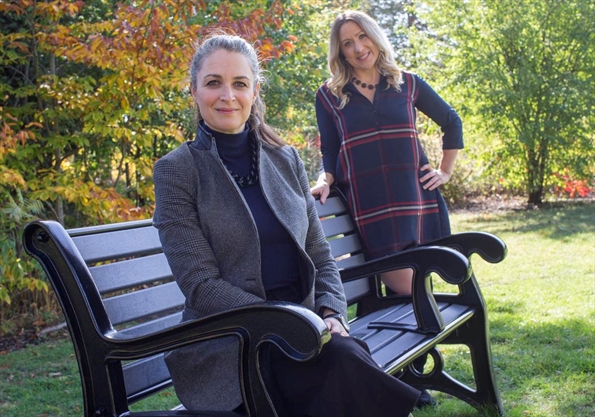A new program based in Toronto aims to rectify the years-long wait times for thousands of youth seeking access to mental health care across Canada.
Through an eight-week, intensive, online therapy platform, the New Start Digital Youth Intensive Outpatient Program is hoping to provide mental health care hundreds of youth aged 14 to 18 who are struggling with stress, anxiety and risky behaviour. The first group enrolled in the program began receiving care on Monday.
The program — the first of its kind in Canada — draws on existing approaches to virtual mental health care while also offering an education component to parents or guardians. It also uses a mobile application to appeal to its young participants.

The program is mainly funded by private donors, but there are hopes it will expand and reshape the future of youth mental health care in Canada.
“We’re able to access clients in remote areas who previously had barriers to accessing mental health, be it geographic barriers, financial barriers, and even emotional barriers,” said Toronto psychotherapist and National Director of Outpatient Services at EHN Canada Lanie Schachter-Snipper.

“Personally, I am very enthusiastic about online care,” she added.
Schachter-Snipper and Kalandra Roach, the executive director of New Start Foundation for Addiction and Mental Health — the organization behind the virtual program — said they were inspired to start an online platform for youth due to the notoriously long wait times to access mental health care in Ontario.
A estimates there are 200,000 kids with serious mental health issues in the province who have had no contact with services. The longest wait time to access care in the province is 2.5 years for children in York Region. In Toronto, the wait is almost two years.
The average wait for counselling and therapy is 67 days, CMHO’s report said. For intensive treatment, it’s 92 days. , Roach said.
“It’s pretty unacceptable in our opinion,” Roach said of the wait times. “We need a better system. The system is not working and we need to get kids the right, effective treatment as soon as possible.”
Roach said the New Start Foundation has a few goals in mind to reduce the waits for youth mental health care: one is to fund 500 youth from across the country to enrol in the digital program by 2021. The other is to build a new youth mental health care facility in Toronto.
Twenty youth across Ontario are participating in the inaugural version of the intensive outpatient program through a subsidized fee of $50 to ensure they stick with it, though it can be waived if money is a severe barrier.
The youth were screened by a clinical psychologist to assess their suitability, and lower-income participants from historically underserved communities were prioritized, Roach said.
The youth will participate in two-and-a-half hours of individual and group therapy sessions a week for eight weeks, Schachter-Snipper said. Meanwhile, parents or guardians will receive 16 hours of caregiver support over the course of the program.
“When mental health issues arise, it’s easier to have conversations about what’s going on, because the families or the caregivers have been provided psycho-education on mental health,” Schachter-Snipper explained.
Youth also have access to a mobile application in addition to the face-to-face online counselling they receive, which helps them work on the skills they’ve learned through therapy, Schachter-Snipper said.
The program is designed for young people who struggle with stress, anxiety or sadness, or may be engaging in risky behaviours to cope with their emotions, Roach said.
It teaches a combination of Cognitive Behavioural Therapy — a standard in mental health focused on challenging negative thoughts that alter behaviour, and Acceptance and Commitment Therapy — an approach that teaches people to accept their thoughts, encouraging mindfulness and discouraging guilt associated with negative emotions.
Another criteria for enrolment, Schachter-Snipper said, is that youth need to have access to technology to support the program’s online platform — a criteria she acknowledged is a barrier to many who need this type of treatment, despite the
“We’re really trying to reduce barriers,” she said, adding the foundation is working on building a tech library that can lend youth the hardware necessary to access this type of care.
“But at this point, [virtual care] is really the only barrier-free way to provide mental health services given the uncertain nature of the pandemic and everyone’s emphasis on being safe,” Schachter-Snipper said.
Both Roach and Schachter-Snipper said the nominal cost is key to ensuring more youth can access this type of mental health care — which is usually expensive since services by clinical psychologists and psychotherapists are not covered by OHIP.
The program has been mostly funded by private donors, said Roach, who has worked in Toronto’s health care fundraising sphere for the last seven years. The foundation hopes to secure funding from the province to continue programming and help fund its tech library.
Overall, Schachter-Snipper said the program is an example of how mental health care could live online even beyond the pandemic. It increases access for people who are otherwise physically far away from mental health professionals, or have other barriers to reaching mental health centres, she said.
“There’s a high degree of excitement and enthusiasm,” Schachter-Snipper said. “We know that we can just provide services to so many more people, and it works.”
Correction – Oct. 21, 2020: This article has been corrected to reflect that Lanie Schachter-Snipper is the National Director of Outpatient Services at EHN Canada.
Nadine Yousif is a Toronto-based reporter for the Star covering mental health. Her reporting is funded by the Canadian government through its Local Journalism Initiative. Follow her on Twitter:
